-
 Bitcoin
Bitcoin $94,471.0488
-0.88% -
 Ethereum
Ethereum $1,814.5384
-0.50% -
 Tether USDt
Tether USDt $0.9999
-0.02% -
 XRP
XRP $2.1443
-1.48% -
 BNB
BNB $598.8898
2.05% -
 Solana
Solana $145.6028
-0.71% -
 USDC
USDC $0.9999
-0.01% -
 Dogecoin
Dogecoin $0.1709
-0.42% -
 TRON
TRON $0.2490
0.38% -
 Cardano
Cardano $0.6641
-2.71% -
 Sui
Sui $3.4429
5.73% -
 Chainlink
Chainlink $13.6963
-2.09% -
 Avalanche
Avalanche $19.6187
-1.45% -
 Stellar
Stellar $0.2604
-2.19% -
 UNUS SED LEO
UNUS SED LEO $8.6547
-4.77% -
 Shiba Inu
Shiba Inu $0.0...01271
0.44% -
 Hedera
Hedera $0.1751
-0.49% -
 Toncoin
Toncoin $2.9797
-2.31% -
 Bitcoin Cash
Bitcoin Cash $354.4724
0.26% -
 Hyperliquid
Hyperliquid $20.3266
-0.94% -
 Litecoin
Litecoin $86.3551
0.45% -
 Polkadot
Polkadot $3.9453
0.99% -
 Dai
Dai $1.0000
0.00% -
 Monero
Monero $275.8359
-0.53% -
 Bitget Token
Bitget Token $4.3020
-0.92% -
 Ethena USDe
Ethena USDe $1.0003
-0.01% -
 Pi
Pi $0.5934
0.83% -
 Pepe
Pepe $0.0...07936
-0.90% -
 Bittensor
Bittensor $370.2183
6.95% -
 Aptos
Aptos $5.0853
-0.05%
Digital currency wallet recommended downloads
A cryptocurrency wallet serves as the gateway to the digital asset ecosystem, enabling users to securely store, send, and receive their virtual funds.
Jan 12, 2025 at 03:48 pm
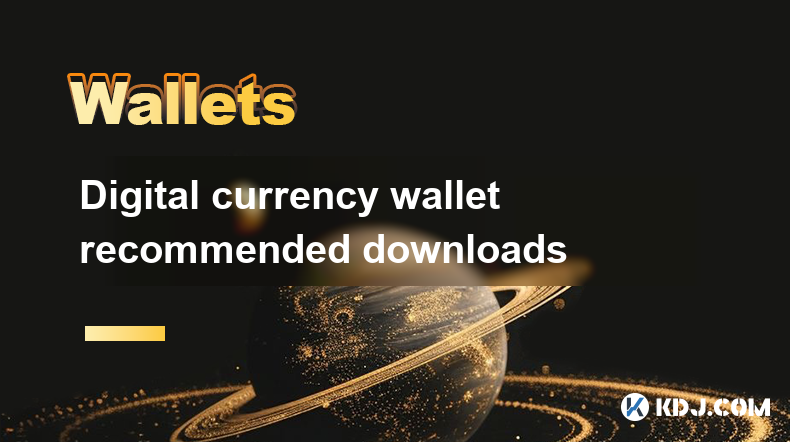
Key Points:
- Understanding the Need for Cryptocurrency Wallets
- Types of Cryptocurrency Wallets
- Factors to Consider When Choosing a Cryptocurrency Wallet
- Recommended Cryptocurrency Wallets for Beginners
- Recommended Cryptocurrency Wallets for Advanced Users
- Security Measures for Securing Your Cryptocurrency Wallet
- Best Practices for Managing Cryptocurrency Wallets
- FAQs on Cryptocurrency Wallet Recommendations
Understanding the Need for Cryptocurrency Wallets
Cryptocurrency wallets are essential tools for securely storing, sending, and receiving digital assets. Unlike traditional bank accounts, cryptocurrency wallets do not hold actual currency but rather the private keys that grant access to funds held on the blockchain. Without a cryptocurrency wallet, individuals would be unable to interact with the cryptocurrency ecosystem.
Types of Cryptocurrency Wallets
Different types of cryptocurrency wallets cater to the diverse needs of cryptocurrency users. The main types include:
- Software Wallets: Installed on a computer, smartphone, or tablet, these wallets offer convenience and accessibility but may be susceptible to malware and hacking attacks.
- Hardware Wallets: Dedicated devices designed specifically for cryptocurrency storage, providing enhanced security through offline storage and tamper-proof hardware.
- Paper Wallets: Physical documents containing printable private and public keys, offering high security but with limited accessibility and risk of damage or loss.
- Online Wallets: Accessible through web browsers, these wallets offer ease of use but may raise concerns about third-party access and security vulnerabilities.
Factors to Consider When Choosing a Cryptocurrency Wallet
Selecting an appropriate cryptocurrency wallet involves considering factors such as:
- Security: The wallet's ability to protect funds from theft, hacking, and malware attacks.
- User-friendliness: The ease of use, navigation, and accessibility of the wallet.
- Supported Currencies: The wallet's compatibility with specific cryptocurrencies and its multi-asset capabilities.
- Transaction Fees: The costs associated with sending and receiving cryptocurrency.
- Reputation: The wallet's track record, reliability, and user reviews.
Recommended Cryptocurrency Wallets for Beginners
- Exodus: A user-friendly multi-asset software wallet with a simple interface and integrated exchange.
- Trezor Model T: A highly secure hardware wallet with an intuitive touchscreen and support for numerous cryptocurrencies.
- Ledger Nano S Plus: Another reputable hardware wallet with a compact design and high-security features.
- Trust Wallet: A mobile-based software wallet designed for beginners and supports a wide range of cryptocurrencies.
Recommended Cryptocurrency Wallets for Advanced Users
- MetaMask: A popular browser extension wallet that allows users to interact with decentralized applications.
- Coinbase Wallet: A multi-chain software wallet with advanced trading features and support for various dApps.
- Safepal S1: A premium hardware wallet with a touchscreen and Bluetooth connectivity.
- Arculus: A secure hardware wallet with a built-in biometric sensor and multi-asset support.
Security Measures for Securing Your Cryptocurrency Wallet
To ensure the safety of cryptocurrency funds, it is crucial to implement security measures such as:
- Use Strong Passwords: Create complex and unique passwords for your wallet.
- Enable Two-Factor Authentication (2FA): Add an extra layer of security by requiring a verification code sent to your phone or email.
- Store Private Keys Securely: Keep private keys offline in cold storage or on a physically secure device.
- Be Aware of Phishing Scams: Watch out for emails or messages attempting to trick you into revealing sensitive information.
- Update Software Regularly: Install the latest software updates to patch any security vulnerabilities.
Best Practices for Managing Cryptocurrency Wallets
For effective management of cryptocurrency wallets, adopt best practices such as:
- Monitor Transactions Regularly: Keep track of incoming and outgoing transactions to detect any unauthorized activity.
- Backup Your Wallet: Store a backup of your wallet seed phrase in a secure location.
- Use a Dedicated Cryptocurrency Wallet: Separate your cryptocurrency wallet from your general-purpose computer or device.
- Don't Share Your Private Keys: Keep your private keys secret and never share them with anyone.
- Stay Informed About Crypto Security: Keep abreast of the latest cryptocurrency security trends and vulnerabilities.
FAQs on Cryptocurrency Wallet Recommendations
Q: Which type of cryptocurrency wallet is most secure?
A: Hardware wallets, such as Trezor and Ledger, provide the highest level of security for cryptocurrency assets.
Q: Is it necessary to use a hardware wallet for all cryptocurrencies?
A: It is advisable to use a hardware wallet for storing large amounts of cryptocurrency or for enhanced security. However, software wallets may suffice if funds are modest and security is not a primary concern.
Q: How often should I back up my cryptocurrency wallet?
A: It is recommended to back up your cryptocurrency wallet regularly, especially before making any significant changes or transactions.
Disclaimer:info@kdj.com
The information provided is not trading advice. kdj.com does not assume any responsibility for any investments made based on the information provided in this article. Cryptocurrencies are highly volatile and it is highly recommended that you invest with caution after thorough research!
If you believe that the content used on this website infringes your copyright, please contact us immediately (info@kdj.com) and we will delete it promptly.
- Christian Thompson, Managing Director of the Sui Foundation, stated that bipartisan U.S. stablecoin legislation will be a powerful mechanism for driving capital formation and retail onboarding into Web3 ecosystems.
- 2025-05-06 00:20:12
- Robert Kiyosaki Warns of the Biggest Market Crash in History and Urges Investment in Bitcoin.
- 2025-05-06 00:20:12
- Toronto, ON – May 5 2025 @ 9 AM ET – ETHToronto and ETHWomen to Commemorate the 10-Year Anniversary of Ethereum
- 2025-05-06 00:15:12
- Bonk (BONK), the largest Solana-based dog-themed meme coin, is the third-fastest-growing crypto today
- 2025-05-06 00:15:12
- TAO Price Prepares for a Supply Shock — What Happens When the Bittensor Halvening Hits?
- 2025-05-06 00:10:11
- Cardano (ADA) Closing the Market Cap Gap With Dogecoin (DOGE)
- 2025-05-06 00:10:11
Related knowledge
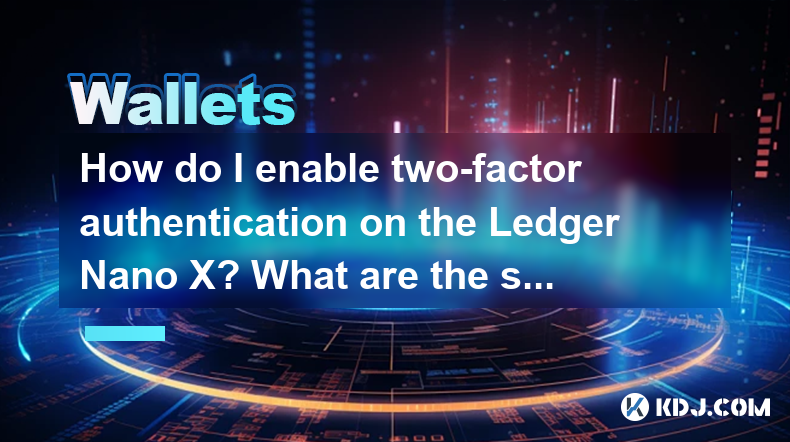
How do I enable two-factor authentication on the Ledger Nano X? What are the security options?
May 02,2025 at 09:49pm
Enabling two-factor authentication (2FA) on your Ledger Nano X is a critical step in securing your cryptocurrency assets. The Ledger Nano X offers robust security options that enhance the protection of your digital wealth. In this article, we will guide you through the process of enabling 2FA on your Ledger Nano X and explore the various security featur...
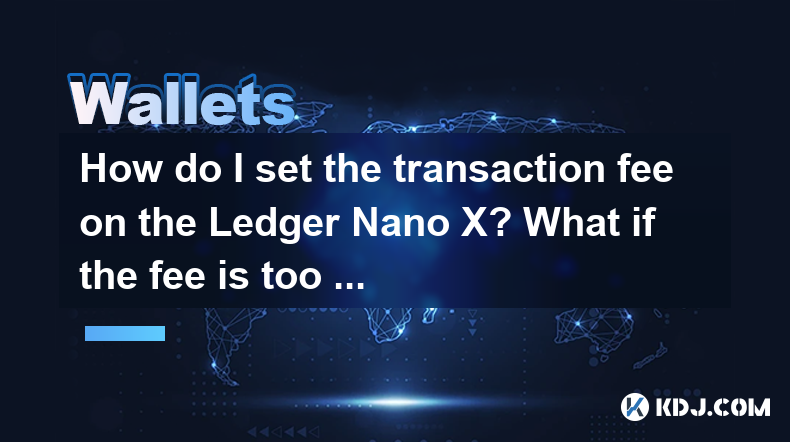
How do I set the transaction fee on the Ledger Nano X? What if the fee is too high?
May 05,2025 at 09:21pm
Setting the transaction fee on your Ledger Nano X is an essential part of managing your cryptocurrency transactions efficiently. The transaction fee directly impacts how quickly your transaction is processed and confirmed on the blockchain. In this guide, we will walk you through the steps to set the transaction fee on your Ledger Nano X, and what to do...

How do I export the Ledger Nano X transaction history? How long can the data be saved?
May 04,2025 at 07:21am
Introduction to Ledger Nano X and Transaction HistoryThe Ledger Nano X is a hardware wallet designed to store your cryptocurrency safely. It supports a wide range of cryptocurrencies and offers robust security features. One of the essential aspects of managing your cryptocurrencies is keeping track of your transaction history. The Ledger Nano X allows y...
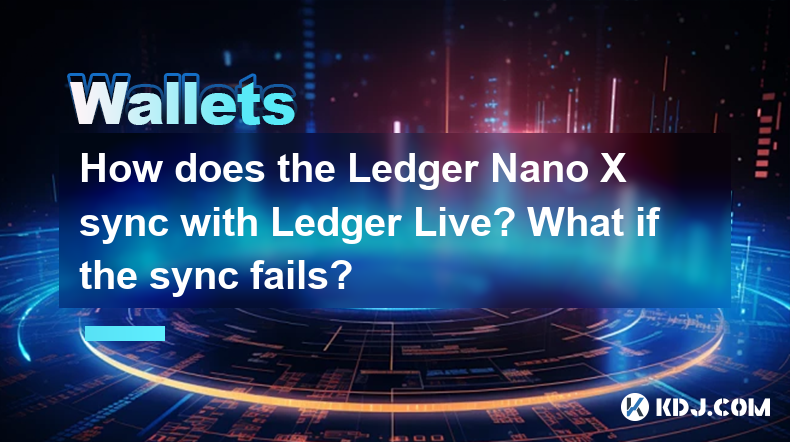
How does the Ledger Nano X sync with Ledger Live? What if the sync fails?
May 04,2025 at 12:07pm
The Ledger Nano X is a popular hardware wallet that allows users to securely manage their cryptocurrency assets. One of the key features of the Ledger Nano X is its ability to sync with the Ledger Live application, which provides a user-friendly interface for managing your crypto portfolio. In this article, we will explore how the Ledger Nano X syncs wi...

How do I send cryptocurrency with the Ledger Nano X? What are the transaction confirmation steps?
May 03,2025 at 05:01am
Sending cryptocurrency using the Ledger Nano X involves a series of steps that ensure the security and accuracy of your transactions. This process is designed to be user-friendly while maintaining the high level of security that Ledger devices are known for. In this article, we will guide you through the process of sending cryptocurrency with the Ledger...
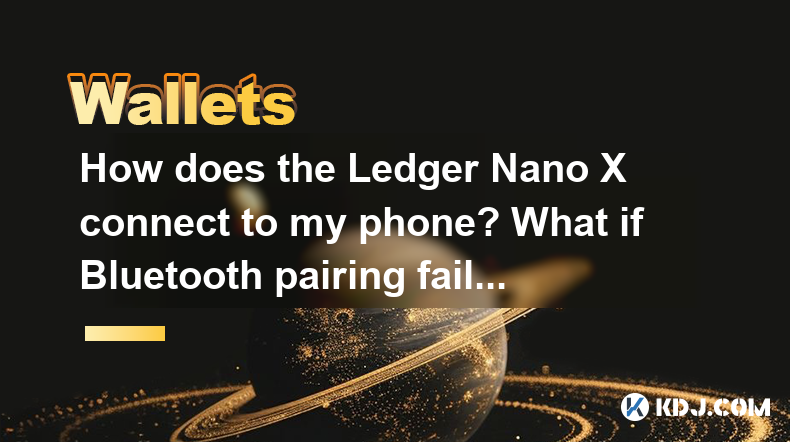
How does the Ledger Nano X connect to my phone? What if Bluetooth pairing fails?
May 02,2025 at 07:07pm
The Ledger Nano X is a popular hardware wallet designed to securely store your cryptocurrency. One of its key features is the ability to connect to your smartphone via Bluetooth, allowing for a seamless and convenient user experience. In this article, we will explore how to connect your Ledger Nano X to your phone and what to do if Bluetooth pairing fai...

How do I enable two-factor authentication on the Ledger Nano X? What are the security options?
May 02,2025 at 09:49pm
Enabling two-factor authentication (2FA) on your Ledger Nano X is a critical step in securing your cryptocurrency assets. The Ledger Nano X offers robust security options that enhance the protection of your digital wealth. In this article, we will guide you through the process of enabling 2FA on your Ledger Nano X and explore the various security featur...

How do I set the transaction fee on the Ledger Nano X? What if the fee is too high?
May 05,2025 at 09:21pm
Setting the transaction fee on your Ledger Nano X is an essential part of managing your cryptocurrency transactions efficiently. The transaction fee directly impacts how quickly your transaction is processed and confirmed on the blockchain. In this guide, we will walk you through the steps to set the transaction fee on your Ledger Nano X, and what to do...

How do I export the Ledger Nano X transaction history? How long can the data be saved?
May 04,2025 at 07:21am
Introduction to Ledger Nano X and Transaction HistoryThe Ledger Nano X is a hardware wallet designed to store your cryptocurrency safely. It supports a wide range of cryptocurrencies and offers robust security features. One of the essential aspects of managing your cryptocurrencies is keeping track of your transaction history. The Ledger Nano X allows y...

How does the Ledger Nano X sync with Ledger Live? What if the sync fails?
May 04,2025 at 12:07pm
The Ledger Nano X is a popular hardware wallet that allows users to securely manage their cryptocurrency assets. One of the key features of the Ledger Nano X is its ability to sync with the Ledger Live application, which provides a user-friendly interface for managing your crypto portfolio. In this article, we will explore how the Ledger Nano X syncs wi...

How do I send cryptocurrency with the Ledger Nano X? What are the transaction confirmation steps?
May 03,2025 at 05:01am
Sending cryptocurrency using the Ledger Nano X involves a series of steps that ensure the security and accuracy of your transactions. This process is designed to be user-friendly while maintaining the high level of security that Ledger devices are known for. In this article, we will guide you through the process of sending cryptocurrency with the Ledger...

How does the Ledger Nano X connect to my phone? What if Bluetooth pairing fails?
May 02,2025 at 07:07pm
The Ledger Nano X is a popular hardware wallet designed to securely store your cryptocurrency. One of its key features is the ability to connect to your smartphone via Bluetooth, allowing for a seamless and convenient user experience. In this article, we will explore how to connect your Ledger Nano X to your phone and what to do if Bluetooth pairing fai...
See all articles




















































































